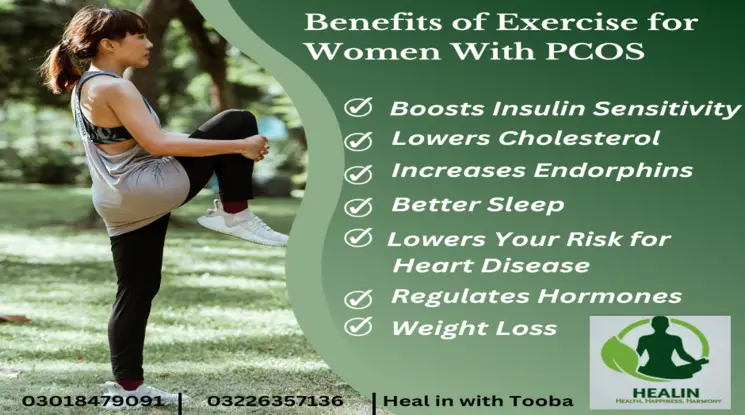
Polycystic Ovary Syndrome (PCOS) is a common hormonal disorder that affects people with ovaries, often leading to irregular periods, cysts on the ovaries, and various symptoms like acne and hair growth. While there is no cure for PCOS, lifestyle changes, including regular exercise, can play a crucial role in managing its symptoms and promoting overall well-being.
Understanding PCOS and Exercise:

PCOS is often associated with insulin resistance, which can lead to weight gain and difficulties in maintaining a healthy weight. Exercise becomes a powerful tool in addressing these challenges. Regular physical activity helps improve insulin sensitivity, regulate blood sugar levels, and support weight management.
Cardiovascular Exercise:

Incorporating cardiovascular exercises into your routine can have numerous benefits for individuals with PCOS. Activities such as brisk walking, jogging, cycling, or swimming not only aid in weight management but also enhance cardiovascular health. Aim for at least 150 minutes of moderate-intensity exercise per week, gradually increasing duration and intensity as fitness improves.
Strength Training:

Strength training is another essential component of managing PCOS. Building lean muscle mass helps boost metabolism, making it easier to maintain a healthy weight. Include resistance exercises such as weight lifting or bodyweight exercises in your routine. Start with two or three sessions per week, focusing on different muscle groups.
Yoga and Stress Management:

PCOS is often associated with stress, which can exacerbate symptoms. Incorporating stress-reducing activities like yoga and meditation into your routine can be beneficial. These practices not only help manage stress but also promote relaxation and improve overall mental well-being.
Consistency is Key:

Consistency is crucial when managing PCOS through exercise. Establish a realistic and sustainable routine that you enjoy. This could be a combination of different exercises, ensuring variety and preventing monotony. Consistent physical activity can have long-term positive effects on hormone regulation and overall health.
Consultation with Healthcare Professionals:

Before starting any exercise program, it’s essential to consult with healthcare professionals, especially if you have underlying health conditions or concerns. They can provide personalized guidance based on your individual health status and goals.
Conclusion:

Incorporating regular exercise into your lifestyle can be a game-changer when managing PCOS. Whether it’s cardiovascular exercise, strength training, or stress-reducing activities, each plays a unique role in promoting overall health and well-being. Empower yourself by making exercise a fundamental part of your PCOS management plan, and remember that small, consistent steps can lead to significant improvements in your quality of life.











